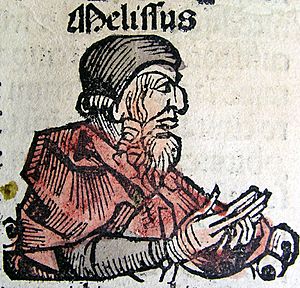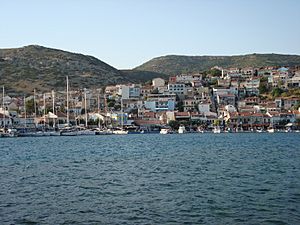Melissus of Samos facts for kids
Quick facts for kids
Melissus of Samos
|
|
|---|---|

An illustration of Melissus of Samos from the Nuremberg Chronicle
|
|
| Born | |
| Era | Ancient philosophy |
| Region | Western philosophy |
| School | Eleatic school |
|
Main interests
|
Metaphysics |
|
Notable ideas
|
'What is' is both One and Infinite Nothing comes from nothing |
|
Influences
|
|
Melissus of Samos was an important ancient Greek thinker. He was the third and last member of the Eleatic school of philosophy. Other famous Eleatic philosophers were Zeno and Parmenides.
Not much is known about Melissus's life. We know he was a commander of the Samian fleet. He wrote a book of arguments to explain Eleatic philosophy. Like Parmenides, he believed that reality is unchanging. He thought it was also unlimited and infinite.
Contents
Life of Melissus
We don't have much information about Melissus's life. He might have been born around 500 BC. We don't know when he died. Most of what we know comes from a book by Plutarch called Life of Pericles.
Melissus was a commander of the fleet from Samos. This was an island in ancient Greece. He fought against Pericles and the Athenian fleet in 440 BC. Some stories say he won that battle. It was also said that Melissus was a student of Parmenides. He might have also taught Leucippus.
Melissus's Philosophy
Many of Melissus's ideas come from his book, On Nature. This book was saved by a writer named Simplicius. Unlike Parmenides, Melissus wrote his book in simple prose. This made his ideas easier to understand.
Melissus believed that "Being" (what truly exists) is one. He thought it was not created and cannot be destroyed. He also believed it was whole, unchanging, and still. Melissus's ideas were a bit different from Parmenides's. Parmenides thought Being was limited. Melissus believed it was completely unlimited. Parmenides saw Being as existing in one timeless moment. Melissus thought Being was eternal, lasting forever.
Eternal Existence
Melissus argued that "The One" (what truly exists) is eternal. This means it has no beginning and no end. He said that if something comes into existence, it must have a start. Since The One did not start, it must have always existed.
He also argued that if something has a beginning, it must also end. Since The One had no beginning, it will never end. So, The One has always existed in the past and will always exist in the future. This is how he saw The One as eternal.
Unlimited Nature
Melissus also said that The One is unlimited. This means it has no boundaries or edges. He thought it was infinite in all directions. It's like it stretches out forever without stopping.
He connected being eternal with being unlimited. He argued that if something has a beginning and an end, it's not eternal or unlimited. Since Being has no beginning or end, it must be both eternal and unlimited.
The One and Only
Melissus's best argument was for The One being truly one. He said that because what exists is unlimited, it must be only one thing. If there were more than one thing, they would have boundaries. These boundaries would be between what exists and other objects.
So, if something is unlimited in space and time, it cannot share that space or time with anything else that is also unlimited. Therefore, what truly exists must be just one thing.
Always the Same
Melissus also believed that The One is always the same. It doesn't change its qualities. Imagine a human: it has a head, body, arms, and legs. But it's still one human. Melissus thought The One was completely unified. It has no separate parts.
He argued that if what exists had different qualities, it would be many things, not one. But since what exists is one and whole, it must have no differences in its qualities. It is always the same.
Never Changing
Melissus argued that The One cannot change in any way. He said it cannot be rearranged. It cannot get bigger or smaller. It cannot suffer any harm. If The One changed, it would become different. Then it would no longer be unified or whole.
So, he believed that anything that changes is altered. Anything altered is not unified or whole. Since The One is unified and whole, it cannot change at all.
Always Motionless
Melissus also argued that The One cannot move. He said that The One is "full." This means it has no empty spaces. If it had empty spaces, it would be nothing, and nothing cannot exist.
Since The One is full, it cannot move. Anything that moves needs empty space to move into. But if The One is completely full, there's no empty space for it to move into. Therefore, The One must be motionless.
No Physical Body
Melissus made a surprising claim: The One has no physical body. He argued that The One is whole and has no parts. If it has no parts, it cannot have thickness. And if it has no thickness, it cannot have a body.
This idea might seem strange. How can something be unlimited and full but have no body? Melissus might have meant that a body has limits. But The One is unlimited. So, something without limits is not a body. Also, thickness is a measure between limits. Since The One is unlimited, it cannot have thickness.
Influence on Others
Melissus's ideas about Eleatic philosophy were important. They were a main source for how Plato and Aristotle understood it. Aristotle thought Melissus's work was "a bit crude." He also said Melissus made "invalid arguments."
However, modern thinkers see Melissus in a better light. They think he was a creative philosopher. He was good at giving clear and direct arguments. Even though he followed Parmenides, Melissus added his own new ideas to Eleatic philosophy.
See also
 In Spanish: Meliso de Samos para niños
In Spanish: Meliso de Samos para niños
 | Bayard Rustin |
 | Jeannette Carter |
 | Jeremiah A. Brown |


